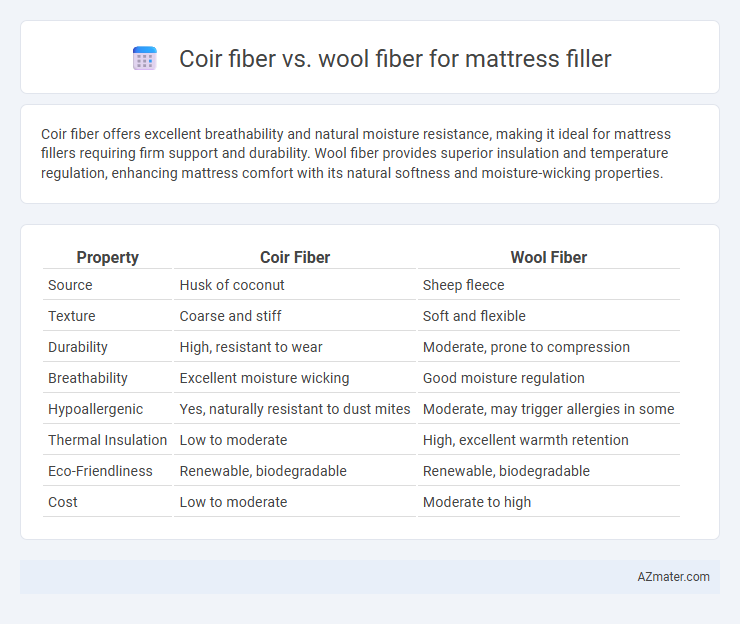Coir fiber offers excellent breathability and natural moisture resistance, making it ideal for mattress fillers requiring firm support and durability. Wool fiber provides superior insulation and temperature regulation, enhancing mattress comfort with its natural softness and moisture-wicking properties.
Table of Comparison
| Property | Coir Fiber | Wool Fiber |
|---|---|---|
| Source | Husk of coconut | Sheep fleece |
| Texture | Coarse and stiff | Soft and flexible |
| Durability | High, resistant to wear | Moderate, prone to compression |
| Breathability | Excellent moisture wicking | Good moisture regulation |
| Hypoallergenic | Yes, naturally resistant to dust mites | Moderate, may trigger allergies in some |
| Thermal Insulation | Low to moderate | High, excellent warmth retention |
| Eco-Friendliness | Renewable, biodegradable | Renewable, biodegradable |
| Cost | Low to moderate | Moderate to high |
Introduction to Mattress Fillers: Coir Fiber vs Wool Fiber
Coir fiber and wool fiber are two popular natural materials used as mattress fillers, each offering unique benefits in comfort and durability. Coir fiber, derived from coconut husks, provides firm support and excellent breathability, making it ideal for individuals needing a more supportive sleeping surface. Wool fiber, sourced from sheep, offers superior temperature regulation and moisture-wicking properties, ensuring a cooler and drier sleep environment while maintaining softness and resilience.
Material Origins: How Coir and Wool Fibers Are Sourced
Coir fiber is derived from the outer husk of coconut shells, primarily sourced from tropical regions like India, Sri Lanka, and the Philippines where coconut palms are abundant. Wool fiber originates from the fleece of sheep, predominantly sourced from countries such as Australia, New Zealand, and the United Kingdom, known for their extensive sheep farming. Both materials undergo specialized processing methods to transform raw fibers into suitable mattress fillers, with coir fibers being cleaned, retted, and dried, while wool undergoes shearing, scouring, and carding.
Physical Properties: Strength, Durability, and Resilience
Coir fiber, derived from coconut husks, exhibits high tensile strength and excellent durability due to its stiff and coarse structure, making it resistant to wear and tear over prolonged use. Wool fiber, sourced from sheep fleece, offers superior resilience and natural elasticity, allowing it to regain shape quickly after compression, which enhances comfort and support in mattresses. While coir tends to be firmer and more supportive, wool provides better cushioning and moisture-wicking properties, influencing the overall physical performance of mattress fillers.
Comfort and Support: Performance as Mattress Fillers
Coir fiber provides firm support and excellent breathability, making it ideal for individuals seeking a resilient mattress filler that maintains shape over time. Wool fiber offers superior comfort with its natural softness and temperature regulation, enhancing sleep quality by adapting to body heat and moisture. Combining both fibers can create a balanced mattress filler that delivers strong support from coir and cushioning comfort from wool.
Breathability and Moisture Regulation
Coir fiber, derived from coconut husks, offers superior breathability and moisture regulation compared to wool fiber, making it ideal for mattress fillers in hot, humid climates. Its natural open structure allows for excellent air circulation, reducing heat buildup and promoting a cooler sleep environment. Wool fiber excels in moisture-wicking and humidity control due to its hygroscopic properties, absorbing and releasing moisture efficiently, which helps maintain dryness and comfort but may retain more heat than coir.
Hypoallergenic and Health Considerations
Coir fiber, derived from coconut husks, is naturally hypoallergenic and resistant to dust mites and mold, making it ideal for allergy sufferers and promoting a healthier sleep environment. Wool fiber also offers excellent hypoallergenic properties due to its natural ability to repel dust mites and regulate moisture, reducing the risk of mildew and bacteria growth. Both fibers contribute to improved indoor air quality and reduce allergen exposure, but coir's ventilation properties make it particularly beneficial for those with respiratory sensitivities.
Eco-Friendliness and Sustainability
Coir fiber, derived from coconut husks, is a renewable, biodegradable material that requires minimal chemical processing, making it highly eco-friendly compared to wool fiber. Wool fiber, sourced from sheep, is also biodegradable and renewable, but its production involves higher water usage and greenhouse gas emissions due to livestock farming. Choosing coir fiber for mattress fillers supports sustainability through efficient resource use and reduced environmental impact over wool.
Maintenance and Longevity
Coir fiber offers exceptional durability and resistance to moisture, making it a low-maintenance mattress filler that retains firmness over time. Wool fiber excels in natural temperature regulation and moisture-wicking properties but requires more frequent care to prevent matting and maintain loft. For long-lasting performance with minimal upkeep, coir fiber outperforms wool fiber in mattress fillings.
Cost Comparison: Coir Fiber vs Wool Fiber
Coir fiber mattress fillers are significantly more cost-effective than wool fiber, making them a popular choice for budget-conscious consumers. The price of coir fiber, derived from coconut husks, is generally lower due to abundant raw material availability and simpler processing methods. In contrast, wool fiber, sourced from sheep, involves higher production costs and market prices, reflecting its natural insulation and durability benefits.
Conclusion: Which Filler Is Best for Your Mattress?
Coir fiber offers exceptional breathability, natural moisture resistance, and firm support, making it ideal for hot climates and those seeking a hypoallergenic mattress filler. Wool fiber excels in temperature regulation, moisture-wicking properties, and provides a softer, more luxurious feel with natural antimicrobial benefits. Choosing between coir and wool depends on individual preferences for firmness, climate, and allergy sensitivity, with coir favored for durability and ventilation, and wool preferred for comfort and thermal balance.

Infographic: Coir fiber vs Wool fiber for Matress Filler
 azmater.com
azmater.com